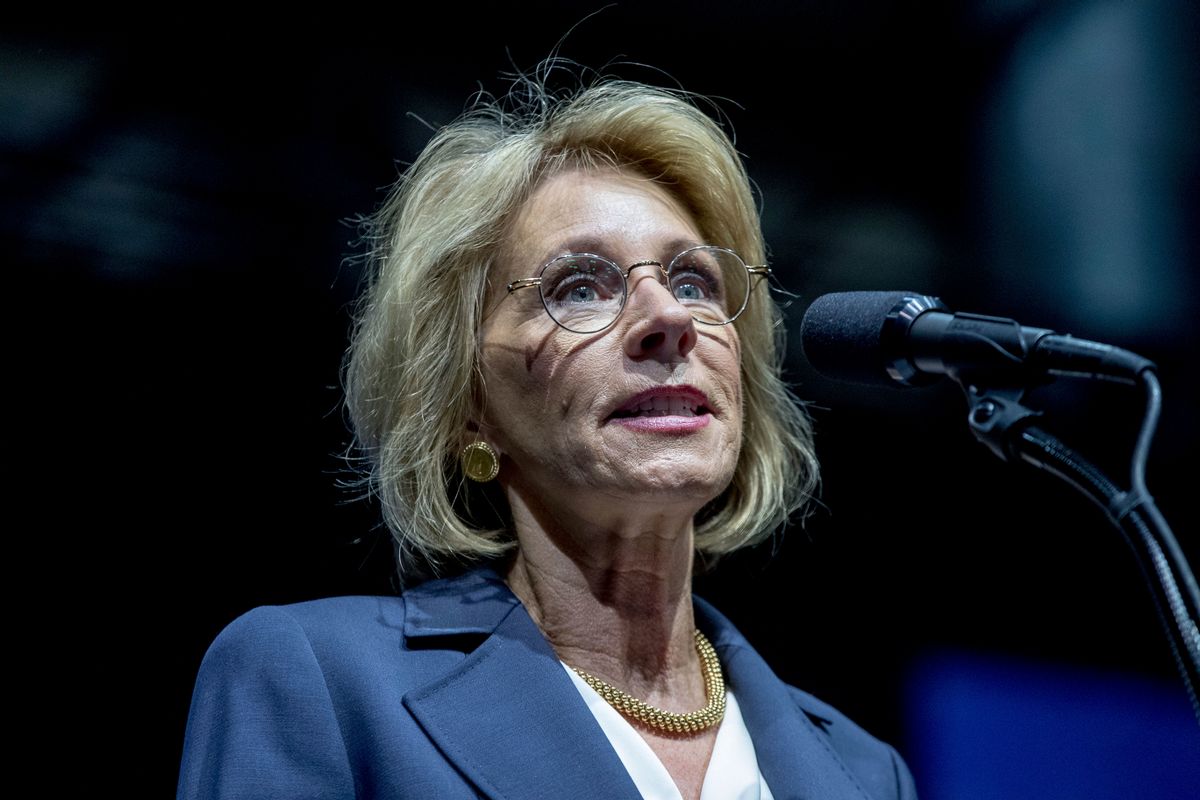Billionaire Betsy DeVos, who was chosen by President-elect Donald Trump as education secretary based on her advocacy for school vouchers and charter schools, raised serious questions about her basic competence for the position during a Senate confirmation hearing on Tuesday.
Perhaps the most notorious moment occurred when Sen. Tim Kaine, D-Virginia, asked DeVos whether she believed a federal law known as the Individuals With Disabilities Act (IDEA) should be extended to public charter and private schools if they receive federal funding. IDEA requires public schools to provide disabled students with a "free appropriate public education," although DeVos didn't seem to know what the bill even was. After initially replying that she believes "that is a matter that is best left to the states," Kaine reminded her that this was a federal law, prompting DeVos to begin discussing a Florida voucher program in which students were required to relinquish their IDEA rights. When Kaine pressed her on the subject, she conceded that it was "certainly worthy of discussion."
When Sen. Maggie Hassan, Democrat from New Hampshire, raised the issue again, DeVos conceded even further, acknowledging that "federal law must be followed where federal dollars are in play." After Hassan asked if DeVos was unaware that IDEA was a federal law, DeVos admitted that she "may have confused it," but promised to be "very sensitive" to the needs of disabled students.
DeVos was similarly evasive when questioned by Sen. Bernie Sanders, I-Vermont, who grilled the school choice advocate on her opinions of students who couldn't afford to go to college.
"Some of us believe that we should make public colleges and universities tuition free so that every young person in this country, regardless of income, does have that option. That's not the case today," Sanders asked. "Will you work with me and others to make public colleges and universities tuition free though federal and state efforts?"
"Senator I think that's a really interesting idea and I think it's really great to consider and think about, but I think we also have to consider the fact that there's nothing in life that's truly free," DeVos replied. "Somebody's going to pay for it."
When Sanders replied by pointing out that many Republicans support reducing taxes for "billionaires in this country while at the same time low-income kids can't afford to go to college," DeVos deflected by simply saying that she would want all families to have "opportunities." Sanders rebutted this by saying that "it's not a question of opportunity, it's a question of being able to afford it."
DeVos even deflected a question about the issue that has defined her philanthropic career -- namely, about using federal money to finance charter and private schools instead of public schools.
"Can you commit that you will not work to privatize public schools or cut a single penny for public education?" asked Sen. Patty Murray, D-Washington.
DeVos refused to give a "yes or no" reply, instead saying that "I look forward to working with you to talk about how to address the needs of all parents and students, and we acknowledged today that not all schools are working for the students that are assigned to them. I am hopeful we can work together to find common ground in ways we can solve those issues and empower parents to make choices on behalf of their children that are right for them."
Murray responded to this by pointing out, "I take that as not being willing to commit to not privatize public schools."
"I guess I would not characterize it in that way," DeVos acknowledged.
When asked, to commit to preserving funding for public education, Betsy #Devos wouldn't. pic.twitter.com/FfqivbUG03
— Senator Patty Murray (@PattyMurray) January 18, 2017
Sen. Elizabeth Warren, D-Massachusetts, similarly held DeVos accountable for claiming to be qualified to run the education department despite having "no personal experience with college financial aid." DeVos ducked the question and instead told a story about how, when she visited a Christian school in her hometown of Grand Rapids, Michigan, she "saw the struggles and sacrifices many of these families faced when trying to choose the best educational option for their children. For me, this was not just an issue of public policy but of national injustice."
On a more ludicrous note, DeVos attempted to swat away a question by Sen. Chris Murphy, D-Connecticut, who asked "Do you think guns have any place in or around schools?" When DeVos replied that the decision is "best left to locales and states to decide" and Murphy repeated his query, DeVos said "I will refer back to Senator Enzi and the school he was talking about in Wyoming … I would imagine that there is probably a gun in the schools to protect from potential grizzlies."
Trump education pick Betsy DeVos says states should determine school gun policies, citing grizzly bear protection https://t.co/raiEsfUruY pic.twitter.com/NX0IY0CLuP — CNN (@CNN) January 18, 2017
Despite these controversial responses, DeVos is still expected to get confirmed as America's next secretary of education.

Shares